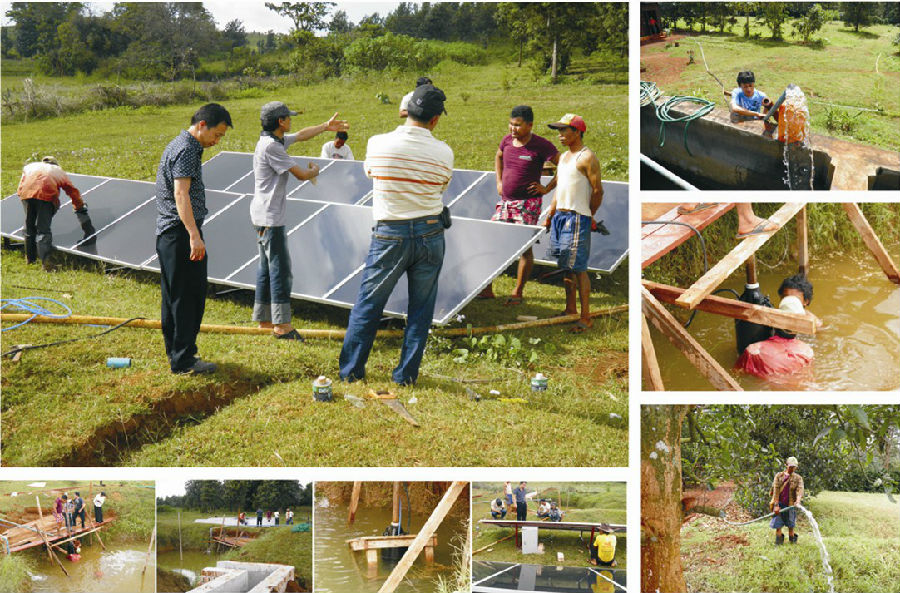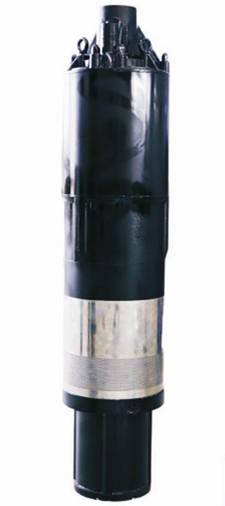Lorentz Solar Pump 3DS-10-100
- Loading Port:
- China Main Port
- Payment Terms:
- TT OR LC
- Min Order Qty:
- -
- Supply Capability:
- 300 sets /month
OKorder Service Pledge
OKorder Financial Service
You Might Also Like
Product description:
Product: Solar water pump
Model:3DS-10
 Appilication:
Appilication:
submersible pump
for deep well or water tank or pond or small lake
for irrigation of a farm cover around 5000 m2
For all kinds of irrigation: flood /sprinkling/ drip
Product specification:
flow rate:4000 liter/ hour, 32m3/day.
lift: 50m-100m
pump diameter: 238mm
well diameter more than 250mm
with BLDC motor, motor power:2000W
but only need solar power:960W, our pump can save more than 50% solar panel power.
Material:
Pump inside: stainless steel and wearable nylon,it enables our solar pump to have 10 years sevice life.
Motor length:30cm,80% shorter than other motors. So that you can pump 80% more water by our solar pump.
Certification:
3 International patent
ISO9001
CE
Warranty:2 years
- Q: Are there any limitations to the type of water source that can be used with a solar pump?
- Yes, there are some limitations to the type of water source that can be used with a solar pump. Solar pumps are typically designed to work with clean water sources such as wells, boreholes, or rivers. They may face challenges in pumping water from sources that have high levels of sediment, debris, or contaminants. Additionally, the efficiency of a solar pump may be affected if the water source has low or inconsistent water levels, as it relies on sunlight to generate power.
- Q: Can solar pumps be used for water supply in beach resorts or tourist destinations?
- Yes, solar pumps can be used for water supply in beach resorts or tourist destinations. Solar pumps are a sustainable and cost-effective solution that can harness energy from the sun to pump and deliver water. They can provide a reliable water source for various needs such as irrigation, swimming pools, and general water supply in these locations, helping to reduce dependence on traditional energy sources and minimize environmental impact.
- Q: Can a solar pump be integrated with existing water infrastructure?
- Yes, a solar pump can be integrated with existing water infrastructure. Solar pumps can be retrofitted into existing water systems, allowing them to operate independently of the grid and provide a sustainable and cost-effective solution for pumping water. The integration process may involve connecting the solar pump to the existing pipelines, storage tanks, or other components of the water infrastructure, ensuring a seamless incorporation of solar power into the system.
- Q: Can a solar pump be used in areas with high levels of pesticides in the water?
- Yes, a solar pump can be used in areas with high levels of pesticides in the water. Solar pumps are designed to draw water from various sources, including wells, rivers, and ponds. While it is important to consider the quality of water being pumped, solar pumps can effectively extract water from contaminated sources. However, it is recommended to use additional water treatment methods to ensure the safety and purity of the water for consumption or other uses.
- Q: Are there any restrictions or regulations for installing a solar pump?
- Yes, there are typically restrictions and regulations for installing a solar pump. These can vary depending on the location and jurisdiction. Some common restrictions may include obtaining permits or approvals, complying with building codes and electrical regulations, and ensuring proper installation and safety measures are followed. It is advisable to consult with local authorities or seek professional advice to ensure compliance with all necessary restrictions and regulations.
- Q: Can a solar pump be used for water supply in hotels and resorts?
- Yes, a solar pump can definitely be used for water supply in hotels and resorts. Solar pumps are a sustainable and cost-effective solution that can provide a reliable source of water for various purposes such as drinking, swimming pools, and irrigation. They are particularly suitable for hotels and resorts as they reduce dependence on traditional electricity, lower operational costs, and align with eco-friendly practices. Furthermore, solar pumps can be easily installed and require minimal maintenance, making them an ideal choice for meeting water supply needs in hospitality establishments.
- Q: What is the maximum depth that a solar pump can operate?
- The maximum depth that a solar pump can operate depends on several factors, including the power and efficiency of the solar panels and the specific design and capabilities of the pump itself. In general, solar pumps are capable of operating up to a depth of around 100 meters (328 feet) or more. However, it is important to note that as the depth increases, the pumping capacity may decrease due to the increased pressure and friction within the system. Additionally, the specific requirements and limitations of the solar pump model should be considered, as some pumps may have a lower maximum operating depth. It is always recommended to consult the manufacturer's specifications and guidelines to determine the maximum depth at which a particular solar pump can effectively operate.
- Q: Can a solar pump be used for water supply in disaster-affected areas?
- Yes, a solar pump can be used for water supply in disaster-affected areas. Solar pumps are an efficient and sustainable solution as they use solar energy to power the pump, eliminating the need for fuel or electricity. They are easy to install and can provide a reliable source of water for drinking, sanitation, and irrigation even in remote or off-grid locations. Additionally, solar pumps are resilient to power outages and can operate independently, making them a suitable choice for disaster-affected areas where traditional power sources may be disrupted.
- Q: Are solar pumps energy-efficient?
- Yes, solar pumps are energy-efficient. They harness the power of the sun to operate, eliminating the need for grid electricity or fossil fuels. This renewable energy source helps reduce carbon emissions, making solar pumps a sustainable and eco-friendly option for various applications such as irrigation, water supply, and pool circulation.
- Q: Can solar pumps be integrated with existing generator or battery backup systems?
- Yes, solar pumps can be integrated with existing generator or battery backup systems. By connecting the solar pump to the generator or battery backup system, it is possible to utilize solar energy during the day and switch to the backup power source when needed, ensuring a continuous water supply.
Send your message to us
Lorentz Solar Pump 3DS-10-100
- Loading Port:
- China Main Port
- Payment Terms:
- TT OR LC
- Min Order Qty:
- -
- Supply Capability:
- 300 sets /month
OKorder Service Pledge
OKorder Financial Service
Similar products
Hot products
Hot Searches
Related keywords





















